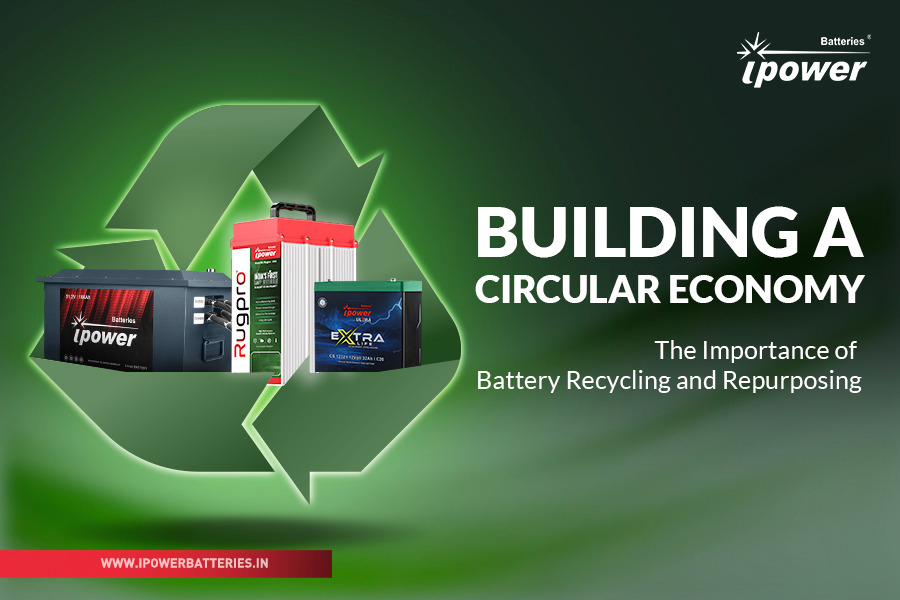The transition to a sustainable energy future is a priority for India, driven by the need to reduce carbon emissions and enhance energy security. Central to this transition is the widespread adoption of renewable energy sources and electric vehicles (EVs), both of which rely heavily on batteries, particularly lithium-ion batteries. As the usage of these batteries escalates, the challenges associated with their end-of-life management become increasingly significant. Battery recycling and repurposing offer a viable solution, presenting not only environmental benefits but also substantial economic opportunities for India by 2030.
Current Scenario of Battery Usage in India
Growth in Renewable Energy and EV Adoption:
India’s renewable energy capacity has been expanding at an unprecedented rate, with the government targeting 175 GW of renewable energy by 2022 and 450 GW by 2030. This growth is complemented by the push towards electric mobility, supported by initiatives such as the Faster Adoption and Manufacturing of Hybrid and Electric Vehicles (FAME) scheme. The proliferation of solar and wind energy projects, along with an increasing number of EVs on the road, has led to a surge in the demand for energy storage solutions.
Challenges of Battery Waste Management:
The surge in battery usage brings about significant challenges in waste management. Lithium-ion batteries, which are commonly used in both renewable energy storage and EVs, contain hazardous materials such as lithium, cobalt, and nickel. Improper disposal can lead to environmental contamination, posing risks to soil and water quality, and subsequently human health. Furthermore, the extraction of raw materials for battery production is resource-intensive and environmentally detrimental, necessitating sustainable end-of-life solutions for these batteries.
Benefits of Battery Recycling
Environmental Protection:
Battery recycling mitigates environmental pollution by preventing the release of toxic substances into the environment. The recycling process involves the recovery of valuable metals and materials, which are then reused in the production of new batteries. This reduces the demand for virgin raw materials and the associated environmental impacts of mining and processing.
Conservation of Natural Resources:
Recycling batteries enables the recovery of critical materials such as lithium, cobalt, nickel, and manganese. These materials are finite and their extraction is often linked to significant environmental degradation. By recycling, the need for new mining operations is diminished, conserving natural resources and reducing the ecological footprint of battery production.
Economic Advantages:
Recycling batteries presents considerable economic benefits. The recovery of valuable metals reduces the reliance on imported raw materials, which are often subject to price volatility. Additionally, the recycling industry can generate employment opportunities, contributing to economic growth. The establishment of a robust battery recycling infrastructure can also foster technological innovation and position India as a leader in sustainable battery management.
Role of Battery Repurposing
Extending Battery Lifespan:
Repurposing involves reusing batteries that are no longer suitable for their original application but still retain a significant portion of their capacity. For instance, batteries from EVs can be repurposed for less demanding applications such as stationary energy storage systems. This approach extends the useful life of batteries, delaying their entry into the waste stream.
Enhancing Renewable Energy Storage:
Repurposed batteries can play a crucial role in supporting renewable energy systems. They can be integrated into energy storage solutions to store excess power generated from renewable sources like solar and wind. This stored energy can then be used during periods of low generation, ensuring a stable and reliable power supply. Repurposing batteries in this manner not only supports the integration of renewable energy into the grid but also enhances energy resilience.
Economic Impact of Repurposing:
The market for second-life batteries is emerging as a cost-effective alternative for energy storage solutions. By repurposing batteries, the initial investment costs for energy storage can be reduced, making renewable energy systems more economically viable. This can accelerate the adoption of renewable energy technologies, driving economic growth and contributing to energy security.
Government Initiatives and Policies
National Battery Policy:
The Indian government is actively working towards establishing a comprehensive battery policy to address the challenges and opportunities associated with the battery lifecycle. This policy aims to promote sustainable practices in battery production, usage, and disposal. Key components of the policy are expected to include guidelines for recycling and repurposing, standards for battery design to facilitate easier recycling, and incentives for the adoption of sustainable practices.
Incentives and Support for Recycling and Repurposing:
To encourage the development of a battery recycling and repurposing industry, the government is offering various incentives. These include tax benefits, subsidies for setting up recycling plants, and grants for research and development in advanced recycling technologies. Additionally, regulatory frameworks are being established to ensure safe and efficient recycling practices, fostering investor confidence in the sector.
Future Prospects
Technological Advancements:
The future of battery recycling and repurposing is closely linked to technological advancements. Innovations in recycling technologies are expected to enhance the efficiency and cost-effectiveness of the process. For example, hydrometallurgical and direct recycling methods are being developed to improve material recovery rates and reduce environmental impact. Similarly, advancements in battery design, such as modular and easy-to-disassemble batteries, can facilitate more efficient recycling and repurposing.
Market Expansion:
The market for recycled and repurposed batteries is poised for significant growth. As awareness of the environmental and economic benefits of recycling and repurposing increases, and as regulatory frameworks become more supportive, the demand for these solutions is expected to rise. By 2030, India could become a global hub for battery recycling and repurposing, leveraging its large domestic market and technological capabilities.
Moving Forward
Battery recycling and repurposing are set to play a pivotal role in the Indian economy by 2030. These practices offer a sustainable solution to the challenges posed by the increasing use of batteries, providing environmental protection, resource conservation, and economic benefits. With supportive government policies, technological advancements, and growing market demand, India has the potential to establish a robust and innovative battery recycling and repurposing industry, contributing to a sustainable and prosperous future.






It’s impressive how far battery technology has come in recent years. The improvements in energy density are making electric vehicles more practical and efficient